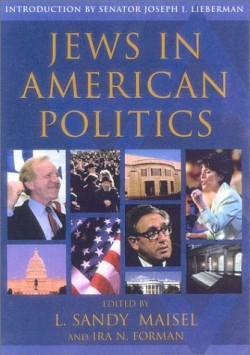Jews in American Politics
When Bella Abzug died in 1998, newspapers reported that she had been the first Jewish woman elected to the House of Representatives. It wasn’t true. Florence Prag Kahn served in the House from 1925 to 1937, one of 156 Jews elected to the House since voters in Pennsylvania elected Lewis Levin in 1845.
There have been twenty-eight Jewish senators, also beginning in 1845, and seventeen Jewish governors; the first was elected in Georgia in 1801. There have been nineteen Jewish cabinet officers; the first, Judah Philip Benjamin, was appointed by Jefferson Davis in 1861. He served as the Confederacy’s attorney general, secretary of war, and secretary of state. Louis Brandeis was the first of seven Jews on the United States Supreme Court, having been appointed by Woodrow Wilson in 1916.
These are just a few of the facts to be found in this insightful book. Its first section includes fourteen analytical essays by political scientists, historians, and journalists, who discuss specific aspects of Jewish participation in American political life.
Some examine their endeavors in particular institutions—the executive branch, Congress, the Supreme Court, political parties, interest groups, and the media. Others explore areas that cut across those institutions—patterns of leadership, voting behavior, contributions to conservative or radical political thought, the unique role of Jewish women, and the importance of American foreign policy for Jews involved in politics.
Although the editors—Maisel is a professor of government at Colby College and the author of more than a dozen books, and Forman is executive director of the National Jewish Democratic Council— did not ask the contributors to develop a particular theme, one does emerge: the Jewish politician was the exception at the turn of the century, or even at the mid-twentieth century. In the last third of the century, however, that status changed. By 2000, Jews had become as prominent in the political realm as they have been in other aspects of American life.
The book’s second section provides brief biographical sketches of more than 400 Jews who have played prominent roles in politics. There’s an introduction by Sen. Joseph Lieberman, the vice presidential nominee in 2000.
This book fills a vacuum, documenting the contributions of two centuries of Jewish experience in the history of American politics.
Reviewed by
George Cohen
Disclosure: This article is not an endorsement, but a review. The publisher of this book provided free copies of the book to have their book reviewed by a professional reviewer. No fee was paid by the publisher for this review. Foreword Reviews only recommends books that we love. Foreword Magazine, Inc. is disclosing this in accordance with the Federal Trade Commission’s 16 CFR, Part 255.

